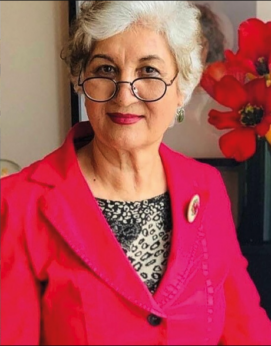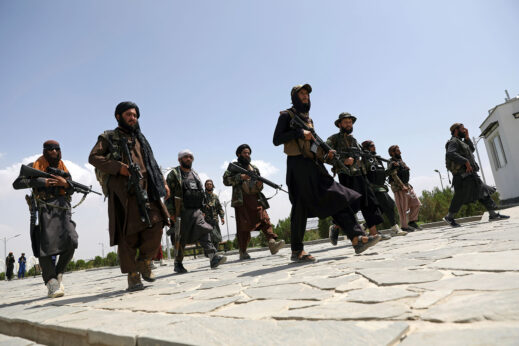
Amilia Spartak was a member of the People’s Democratic Party of Afghanistan when it governed in the 1980s. An advocate for women, she was also a university professor of engineering in Kabul at the time. As a member of the Afghan Democratic Women’s Organization, she participated in international conferences as well as in the Women’s International Democratic Federation (WIDF). In exile, she was responsible for the monthly magazine “Voice of Women,” published by the Council of Afghan Women in Germany. In the following interview, conducted by Morning Star, she speaks on the current status of women in Afghanistan and their future under the Taliban.
Star: Has the Taliban’s conquest of new regions been accompanied by attacks on women’s rights in terms of education, work, and freedom of expression?

Amilia Spartak: There is no doubt that the Taliban’s presence itself will soon diminish the role of women in society.
This time they will be legally stripped of their basic rights, as the Taliban have repeatedly said that women’s rights to education and to work are protected only within the framework of Islamic sharia law. But this could be the beginning of another setback for Afghan women, as Islamic sharia has different meanings in different countries.
All these years, the Taliban have shown that their interpretation of sharia is that of radical Islam, in which there is no place for women—no place for woman’s rights or dignity.
All schools and universities have been closed throughout Afghanistan. In the city of Herat, they have imposed a series of regulations on women, saying that girls can only study until sixth grade. A number of women continued going to work after the fall of (recently deposed Afghan President) Ashraf Ghani’s regime, but unfortunately, they have now been sent home.
“My female employees at my own lab and I were all made to stay home, and the Taliban said that only men should work; one of the male employees now runs the lab,” said one prominent female physician who has a private laboratory in Herat with male and female employees, which she used to manage herself.
Schools across the country are scheduled to start for first to sixth grades at the same time on Aug. 28, and only younger girls have been allowed to attend.
For others, from sixth grade up, tougher regulations may come into effect. They are currently working on how girls’ schools and girls’ education should be, and the priority will be given to enforcing a full-body veil (hijab).
In remote districts and areas that are far from the reach of domestic and international media, they were able to restrain women in their houses. In the capitals of provinces and centers of cities and metropolises, women are still not allowed to go to work.
Even when women in Kabul wanted to go to work at the presidential palace (Arg), they were sent home and were told to wait for the government’s announcement about their employment status.
There are rumors that girls aged 12 to 15 have been forced into jihadi marriages in some districts.
Just days ago, an independent journalist, Nahid Bashardoost, who went to Kabul airport to prepare a news report, was hit hard in the face by the Taliban with a rifle stock and badly injured. People took her home from that location.
A Taliban spokesman said this month that they are “committed to women’s rights, to education, to work, and to freedom of speech, in the light of our Islamic rules.” They also say women will be able to continue to go to school and university. How much weight do you think these promises have?
Official Taliban spokespersons are trying to present a moderate and gentle face of the Taliban. This is a disguise to mask the true face of their policies because they fear that the international community will otherwise not recognize them. Their dictates are largely enforced in places far from the view of the international community.
The promises they make about the treatment of women fall within a broad reading of Islamic sharia and are very vague and unclear.
Also, their policy on diplomatic relations and economic relations with other countries is also very cautious. This is in fact because the Taliban’s Islamic emirate needs economic aid.
If they are committed to putting their words into action, they will speak more precisely. They want to first strengthen their base so that they are not ostracized and isolated by the international community. They are looking for recognition and are trying to make it happen.
The Taliban say they are not seeking vengeance on opponents. How does this match the reality in Kabul and other cities they have taken?
The fact that the Taliban has declared a general amnesty is not actually believable, and I think it is a passing show. Releasing people like Ismail Khan, Qaisari, Salima Mazari (the female governor of Charkint district) is in fact to pretend that they are not seeking revenge.
But there are rumors that in the provinces, before they took over, they have made a long list of police, national security, and military personnel, and they even say that in many provinces they are looking for them door to door. Fortunately, many of them became aware and fled or are in hiding.
Are there particular groups of women who are at greater risk than others, either because of the nature of their jobs, or the community they come from, the Hazara for example?

Unfortunately, under the banner of the terrorist Taliban, all women are at risk. But certain groups of women, such as journalists, those who are in the media, women who have been active in cultural or social arenas, and especially in women’s rights, women who have worked with foreign forces in government offices, are first and foremost at risk from men with sexist perspectives.
If the jihadi marriage and taking small girls away from their families in the districts is true, the international community should investigate this matter and react to these abhorrent acts.
It is very painful even to imagine that women have paid such a heavy price in both war and peace and have made so many sacrifices.
Although they deserve much more, their rights have been stripped away and are still being violated by the patriarchal society. It is noteworthy that 80% of those on recent flights out of Afghanistan are men.
In the case of ethnic and religious minorities, some 15 Hazara individuals were murdered in Ghazni on the eve of the Taliban’s coming to power.
But knowing of previous Taliban massacres of Hazaras and Shia Muslims, everyone is afraid of what is happening. Many Hazara women are very well-informed and active.
They have been active in civic and social arenas such as cultural and sport activities, and are therefore fiercely threatened.
What practical solidarity is possible with the women of Afghanistan now?
The international community should carefully monitor the Taliban’s treatment of women and not forget the need to pressure the Taliban in defense of women’s human rights. This pressure can force the Taliban to comply with internationally acceptable humanitarian laws in dealing with women.
Those women who feel at risk must be helped. In my opinion, priority should be given to those at risk.
These women are the assets of this land, and theirs are the voices of the silent half of society. In spite of all the dual violence against them and the existing material and psychological difficulties, they have stood up, empowered themselves in various areas, and showed that they are very strong.
It is a pity that their free thinking for women’s liberation should cost them their precious lives.
As a women’s human rights defender, I ask all major institutions in the world to help save the lives of women who, in the last 20 years and before that under the mujaheddin and the Taliban, have devoted their lives to serving and working to improve the lives of the people, especially women, and who are currently at risk because of their activities.
Outside Afghanistan, we, the women’s rights activists, have prepared a list of at-risk women, and we hope that with your help, we can save their lives from danger.










